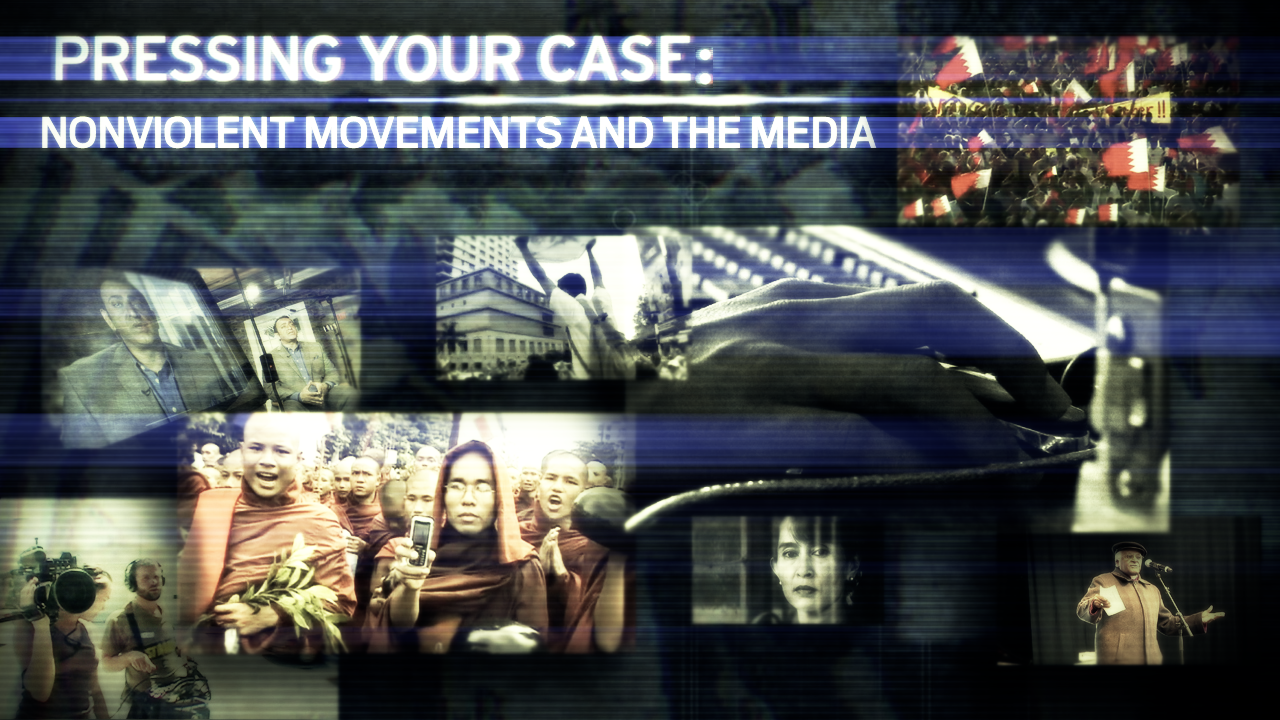
Organizers and strategists of nonviolent movements often struggle in dealing with the mainstream news media. Some consider it their enemy, because coverage can be patchy or inaccurate. Others unrealistically expect the media to advocate for their causes. Yet few resources for activists have provided a reliable explanation of how an effective relationship between a movement and the media might look, and how movement participants can best approach the mainstream media in order to generate interest.
The International Center on Nonviolent Conflict (ICNC) has helped develop “Pressing Your Case: Nonviolent Movements and the Media,” an educational video series to explore ways that nonviolent campaigns and movements can better relate to world media. It features four sessions, hosted by internationally known news anchor Riz Khan, and written and produced by in collaboration with Howard Barrell, a journalist and activist during the struggle against apartheid in South Africa, who is now a senior lecturer in journalism at Cardiff University. This series discusses best practices in enhancing the value of media coverage that campaigns receive.
“Pressing Your Case” interviews many activists, resistance leaders and scholars, including the Nobel Peace Prize laureates Aung San Suu Kyi andArchbishop Desmond Tutu, and the distinguished scholar of peace and conflict studies Dr. Mary Elizabeth King. Throughout the series, interviewees provide their own stories and expertise which together offer original and highly useful information.
In the first session, activists learn how they can affect coverage by developing a media strategy – by identifying the media landscape, the movement’s audience and constituencies, the types of media that work best to reach a given audience, and the content of the core message. This session also explains the distinctions between state media, public service media, commercial media, and social media. The message to activists is clear: Getting the media’s attention is your problem, not theirs.
The second session provides a detailed explanation of a movement’s potential audiences and the best ways to reach them. This includes a more nuanced look at messaging, creating a visual identity, and evoking the human drama present in many effective stories. In this session activists learn that it is often best to deal with bad publicity straight away — and learn how to do so.
The third session lays out the elements of a good story. Activists learn that for their purposes a good story usually focuses on a central character, often delivers a clear, positive message, and connects to what is already in the news. This session also provides tips for activists on how to become a good source and how to give effective interviews.
Editions of this video will be available in several languages.
Nada Alwadi is a Bahraini independent journalist, writer and researcher. She covered the 2011 crackdown in Bahrain for several international media outlets including USA Today. She is a co-founder of the Bahrain Press Association.
Host and Narrator: Riz Khan
Writers and producers:
And
Howard Barrell worked as a journalist and as a political activist inside South Africa and later from exile during the struggle against apartheid in the 1970s and 1980s. He reported mainly on the rise and activities of the United Democratic Front, and on the affairs of the ANC. He is an academic advisor to the Washington-based International Center on Nonviolent Conflict.
Editor: David Isser
Associate Producer: Jason Mojica
ICNC Associates: Jake Fitzpatrick, Matthew Mulberry, Suravi Bhandary, Ashley Farnan.
For further information, please contact: Amber French,